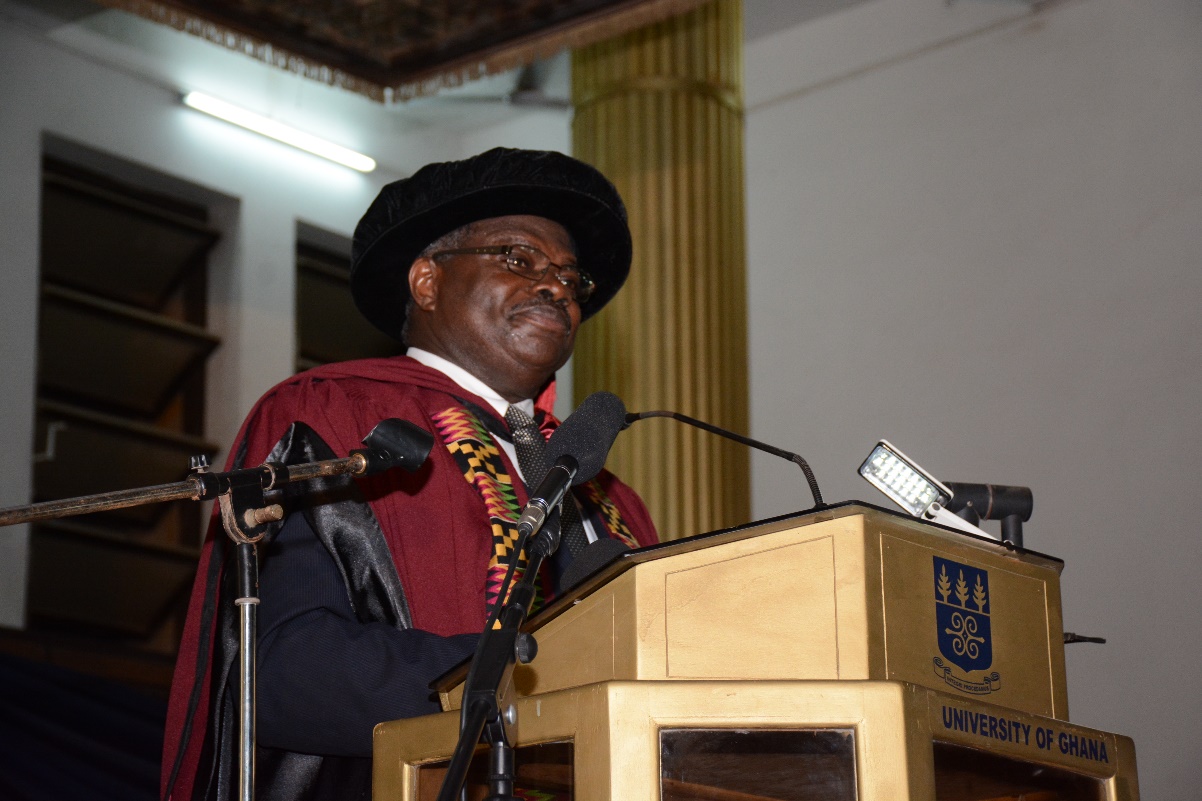



Professor Cephas Narh Omenyo, Provost of the College of Education, has delivered his Inaugural Lecture on the topic, “Growth, Education and Transformation: Resilience of African Christianity?”
In the lecture, Professor Omenyo shared his research work over the years, and highlighted important issues involving contemporary African Christianity. He stressed the need for the revitalization of holistic education and theological training which would empower Christians to positively transform society, as well as to handle issues confronting the Church of today.
He noted that Christianity has become a dominant religious influence in many African societies, due mainly to rapid increases in the number of churches, with the number of Christians doubling every 12 years since the mid-19th Century. He noted that this rapid growth has been accompanied by major challenges that need to be addressed, if the Christian faith is to be firmly rooted on the continent.
Professor Omenyo touched on the recent inclination in which contemporary Christianity is blossoming in Africa at a period when active participation in Christian activities in the West is declining. Another significant aspect, he noted, is the increasing number of African pastors who have taken steps to propagate the Gospel through transcultural missions in Europe and North America. He indicated that while churches in Africa are raising funds to put up new chapels, expanding old ones, and refurbishing existing ones, churches in the West are being transformed into museums and other attractions.

Prof. Cephas Narh Omenyo
He observed that this expansion is largely in the Pentecostal/Charismatic Renewal churches in Africa, making Africa in demographic terms, the heartland of Christianity in the 21st Century. He cited as instances, that there were more Anglicans in Nigeria than Anglicans in the United Kingdom and North America put together, with Nigeria having 17.5 million Anglicans while the United Kingdom and North America had 16.4 million. Another case in point was that the city of Amsterdam alone has more than 50 Ghanaian churches.
Professor Omenyo spoke on the perspectives of prominent personalities, a reference point being the South African President Jacob Zuma’s address to a group of church leaders and members in South Africa. He articulated Jacob Zuma’s concern over the exponential growth of Christian churches in Africa, despite the increase in crime, immoral behaviour, poor work ethics, abduction and terrorism.
Professor Omenyo suggested the introduction of relevant and responsible theological education to beat this canker, and called for a thorough system of education that prioritizes the education of both girls and boys. It should be ensured that training is not confined to the acquisition of academic knowledge alone, but both academic and vocational, as well as developing vernacular to be used as the medium of instruction.

Vice-Chancellor, Professor Ernest Aryeetey
In his closing remarks, the Vice-Chancellor, Professor Ernest Aryeetey noted that the lecture highlighted the significant contribution of Christianity to transforming individual lives, and society as a whole. He said the University of Ghana has a unique role in deepening and diversifying the way theologians are trained, and that it is interesting how faculty in the Department for the Study of Religions have effectively collaborated with colleagues in other areas.
The Vice-Chancellor said it is important to put differences aside and to reflect on values of oneness, shared responsibility, and a common goal. He thanked Professor Omenyo for sharing his knowledge on the importance of religion in addressing societal problems.
Earlier in her welcome remarks, the Registrar of the University, Mrs. Mercy Haizel-Ashia, noted that the lecture was an official acknowledgement of Professor Omenyo’s promotion to the rank of full Professor and to also bring recognition to the College of Education and the Department for the Study of Religions.
Presentations were made to Professor Omenyo by his wife and children, the College of Humanities, the College of Education, the Department for the Study of Religions. There were also presentations from the Schools of Education and Leadership, Information and Communication Studies and Continuing and Distance Education. Other presentations made were from Professor Omenyo’s PhD students, Akuafo Hall, and members of his Church, Grace Presbyterian Church.

Reverend Professor Cephas Omenyo with his family
Prior to delivering the inaugural lecture, a week long exhibition of Professor Omenyo’s scholarly works was held at the Balme Library. The exhibition centered on his research works on various themes; Mission as Intercultural Theology: The African Ghanaian Paradigm; the Charismatics, Pentecostal Practices and African Initiatives in Christianity; Charismatic Renewal in Africa: A Challenge for African Christianity; The Bible Says! Neo-Prophetic Hermeneutics in Africa; Charismatic Healing in the Mainline Churches in Ghana; The Ongoing Encounter Between Christianity and African Culture: A Case of Girls Nubility Rites of the Krobos, among others.

A presentation from the College of Education
The lecture was attended by the Moderator of the General Assembly of the Presbyterian Church of Ghana, Rt. Rev. Professor Emmanuel Martey, Most Rev. Titus Awotwi-Pratt, Presiding Bishop of the Methodist Church, Ghana, Rev. Dr. Samuel Ayete-Nyampong, Clerk of the General Assembly of the Presbyterian Church of Ghana, Rev. Professor J.O.Y. Mante, President, Trinity Theological Seminary, the Rector of Akrofi-Christaller Institute of Theology, Mission and Culture, Rev. Dr. Benhardt Quarshie, and many other members of the Clergy. Also present were the President of Central University College, Professor Kwesi Yankah, the Chairman of the Advisory Board of the College of Education, Mr. Felix Nyarko-Pong, who is also Managing Director of uniBank Ghana , Pro-Vice-Chancellors, other Provosts, Deans, Directors, members of the University community as well as the general public.

A presentation from the School of Continuing and Distance Education

A presentation from Akuafo Hall